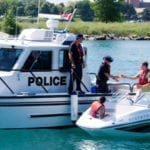
As winter ends and Canada heats back up to a reasonable temperature, many Canadians flock to the water to bask in the often short-lived summer heat. There are tons of boating possibilities across the country’s numerous lakes, from renting a houseboat with friends to fishing to hopping in a neighbour’s motorboat for a ride.
This is a time to socialize and let the cares of the world drift away, a ritual that often includes a few cold drinks on a boat deck. It’s important to note that in Canada, operating a boat while under the influence of alcohol or drugs is a criminal offence. If you’ve been drinking or doing drugs you are considered to be impaired, just as if you were driving a car impaired. Around 65% of boating accidents in Canada involve alcohol consumption, and around 40% of drowning fatalities are alcohol-related.
What are the Penalties?
Across the country, the legal level for operating a boat is a Blood Alcohol Concentration (BAC) of 80mg. If it is your first offence, you’ll be fined a minimum of $600. The second offence is a minimum fine of $600 and at least 14 days behind bars. Any offences after this receive a minimum $600 fine and at least 90 days behind bars. The maximum fine is dependent on the province. In all provinces, the fines and penalties for drinking and boating are the same for drinking and driving in that province.
In most provinces, boaters may only consume alcohol so long as the boat has a permanent toilet, cooking facilities, and sleeping facilities, and it is anchored or moored. In Quebec, you are permitted to drink alcohol while the trip is underway, however, the driver must be under the Federal BAC level of 80mg.
In Ontario, you may additionally have your driver’s license suspended for a minimum of one year if you are convicted of operating a boat while under the influence of alcohol or drugs. Ontario’s Ignition Interlock Program also applies to those convicted of drunk boating.
Why are the fines for drinking and boating so steep?
It appears at first glance that drinking and driving are far more dangerous than drinking and boating. The image of a vehicle veering down a narrow highway into oncoming traffic is a lot worse than a boat floating serenely by itself in the middle of a lake. However, fatalities that are caused by drinking and boating are surprisingly high for a few reasons:
- Balance and coordination are greatly affected by alcohol. People are far more likely to trip and fall overboard when they are drinking.
- Boating accidents are usually remote and hard to access for rescue services. If someone falls overboard, they may not be rescued immediately.
- People who are drinking are less likely to wear a PFD (personal floating device). If a weak swimmer under the influence of alcohol ends up in the water without a PFD, they are in far greater danger of drowning.
- Alcohol opens up blood vessels close to the skin, increasing body heat loss in cold water, so people who are drinking are more susceptible to hypothermia. Besides helping you float, a PFD helps insulate the body in cold temperatures, so if someone falls overboard with no PFD and a high level of alcohol in their blood, they will suffer from hypothermia in a short amount of time.
- Alcohol impairs cognitive function, judgment, and reaction time. A boat driver under the influence is less likely to notice a missing passenger, let alone take action to save a drowning person. They also have more trouble judging distance from obstructions and the shore, making collisions more likely.
All things considered, drinking and boating are just not worth the risk. Summer Fun on the lake is supposed to be fun, after all! Have fun, and boat responsibly!
 Jason Baxter
Jason Baxter